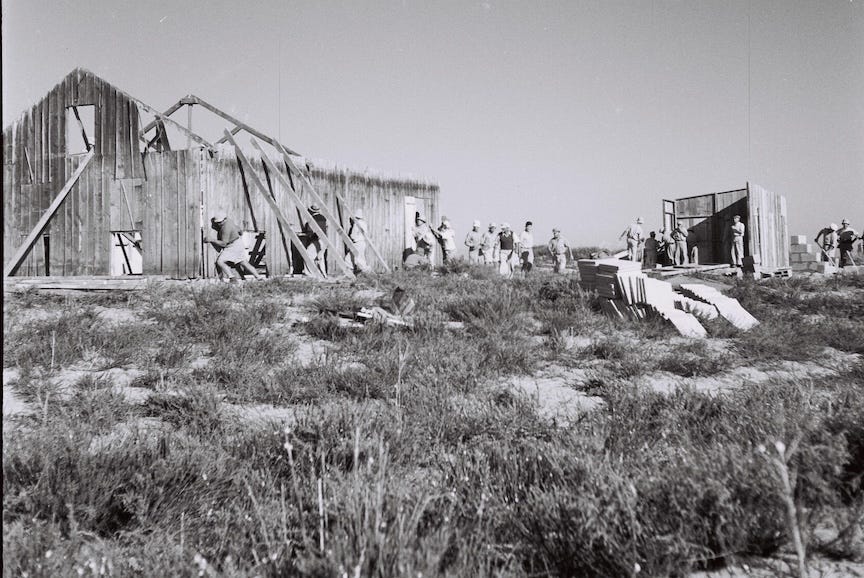DAY 489 IN CAPTIVITY • DAY 19 OF THE CEASEFIRE: Trump Doubles Down on Plan for Gaza, Two Soldiers Are Killed in Gaza Accident, AI Enters Education in Israel
Tel Aviv Diary, February 6, 2025
∞–––––∞–––––∞–––––∞–––––∞–––––∞–––––∞–––––∞–––––∞
Our Next ZOOM BRIEFING will take place on Sunday, February 9th
6PM Israel Time • 4PM GB • 11AM EST • 8AM PST
Invitations will go out on Sunday morning
∞–––––∞–––––∞–––––∞–––––∞–––––∞–––––∞–––––∞–––––∞
I am heading to America in March—mainly to enjoy a trip to Disney with my grandchildren. However, I also wanted to spread the word that I will be available to address groups between March 13-15 and March 20-23. Looking forward to catching up!
∞–––––∞–––––∞–––––∞–––––∞–––––∞–––––∞–––––∞–––––∞
This morning, it came as a shock to receive a notification on my phone of the dreaded “Hutar L’pirsum” (authorized for publication), indicating that two soldiers had died in Gaza. Tragically, the deaths this time were not caused by hostile actions, but by severe weather conditions. Following the driest winter in a century, a winter storm brought strong winds that caused a surveillance tower to collapse on soldiers of the Golani Brigade in northern Gaza. The casualties were Sgt. First Class (res.) Nadav Cohen, 21, from Beit Hanan, and Staff Sgt. Nachman Refael Ben Ami, 20, from Eilat. Additionally, eight other soldiers sustained injuries, some of them serious
.
TRUMP’S PLANS FOR GAZA
Discussions in Israel continue to be dominated by President Trump's plans for the day after. Early this morning, Trump issued the following statement on "Truth Social":
The Gaza Strip would be turned over to the United States by Israel at the conclusion of fighting. The Palestinians, people like Chuck Schumer, would have already been resettled in far safer and more beautiful communities, with new and modern homes, in the region. They would actually have a chance to be happy, safe, and free. The U.S., working with great development teams from all over the World, would slowly and carefully begin the construction of what would become one of the greatest and most spectacular developments of its kind on Earth. No soldiers by the U.S. would be needed! Stability for the region would reign!!!
One thing is clear: Trump has changed the discourse— whether for better or worse remains to be seen. The first point I must note is that his proposal is being taken seriously. While many label Trump as “crazy", they also keep talking about him as someone who gets things done. This fosters the perception that, no matter how implausible his plan may seem, Trump might just succeed in implementing it.
Having written about Trump for many years, I must highlight that many Israelis often overestimate his capabilities. Critics argue that his plan lacks seriousness because it was presented without prior staff work, but this approach is typical for Trump. He isn't one to depend on preparatory staff work; rather, he directs it. The fact that he has now brought up the subject of the U.S. taking over Gaza in different forms over three consecutive days certainly indicates that the topic is on his mind, and he is not likely to abandon the idea anytime soon.
The tremendous apprehension I’ve encountered—both here on the street and from Arab Affairs experts—is that the debate over relocation of Gazans out of Gaza could postpone the ongoing release of hostages. Tomorrow, Hamas is expected to announce the release of three hostages on Saturday. Why did Trump choose to introduce this proposal now? Why divert attention from the plight of the hostages? Moreover, why did Netanyahu appear on Fox last night to commend President Trump’s plan? The negotiations for the second stage of the ceasefire/hostage release were meant to have started already, yet Israeli negotiators have still not received the go-ahead to commence talks.
We will find out in the next day or two, and we can only hope for the best. What I can say for certain is that the families of the hostages are frightened and bewildered by these developments. They had anticipated a definitive statement on finalizing the current hostage deal, yet it seems that the hostages have become a secondary concern in Washington. Meanwhile, Netanyahu is proudly proclaiming that Israel has secured the release of 70% of the hostages, as though no one believed that was possible.
On a positive note, this afternoon Trump declared that he will not rest until all the hostages are safely returned home. One final thought…we can only hope that all this could just be a negotiating ploy.
My Appearance tonight in i24News on the subject:
MINISTRY OF EDUCATION LEAPS INTO A.I.
In a refreshing shift, the Israeli Ministry of Education is taking proactive steps to reimagine education for the 21st Century. Education Minister Yoav Kisch's designation of 2025 as the "Year of Artificial Intelligence" in Israel's education system represents a significant pivot in educational policy. Although Kisch's broader educational agenda has drawn criticism, especially concerning priorities religious education, this initiative demonstrates a noteworthy departure from traditional resistance to incorporating technology in schools.
The program's structure reveals both ambition and practical constraints. The Ministry's collaboration with technology companies, along with its rapid deployment strategy, demonstrates an awareness that in AI education, timely execution might be more critical than meticulous preparation. This approach deserves attention, as the rapid pace of advancement in this field can render prolonged planning cycles counterproductive.
However, the Teachers' Union's critique of the ten-hour training program underscores a significant implementation challenge. The median age of Israeli teachers—42 in elementary and 46 in high schools—combined with high attrition rates (25-33% within five years), suggests that successful AI integration necessitates more robust support structures than those currently proposed.
The context of the initiative is particularly noteworthy. Israel's education system faces systemic challenges, including declining student performance, shortages of teachers in key subjects, and widening skills gaps in the contemporary workforce. Dr. Tomer Simon's citation of a World Bank study conducted in Benin offers compelling evidence of AI's potential impact—it managed to close a two-year learning gap in just six weeks, with significant advantages for female students.
The most promising aspect of this initiative is its national scope and focus on active engagement rather than passive consumption. The potential for AI to serve as a democratizing force in education is considerable, particularly in disadvantaged schools where personalized learning support could significantly help bridge educational disparities.
The initiative, set to roll out throughout 2025, includes teacher training, the development of innovative educational content, and the integration of specialized AI tools in classrooms. The program is designed for all students from 4th to 12th grade and is tailored to accommodate all sectors of Israeli society.
As part of the program, the Ministry has enlisted over 400 leading tech companies, including Google, Microsoft, Apple, and NVIDIA, which have collaborated with the Ministry to train approximately 3,000 mentors. These mentors will support schools in implementing the new technologies and help adapt the tools to meet pedagogical needs.
According to the Ministry of Education, among the new tools being integrated into the system are "Q"—an AI training bot designed specifically for the education system to promote responsible AI use; “Bina”—a chat platform based on Google's Gemini, customized to meet the needs of the Ministry of Education and protected from external influences; Magic School—a platform for lesson planning and student assessment; and a specially adapted Minecraft interface for younger students.
However, for this initiative to succeed, it is essential to avoid the pitfalls that plagued the widespread adoption of past technological efforts, such as the "smart board" program. Success hinges not merely on deploying technology, but on promoting a fundamental shift in educational methodology. Schools must have the flexibility to experiment with AI across various subjects, transitioning away from traditional teaching models to adopt AI as a collaborative learning tool.
This groundbreaking initiative represents more than just technological modernization—it’s an opportunity to reimagine educational engagement for a new era. Although the challenges are significant, the potential benefits of successful implementation could transform Israeli education, particularly for underserved communities. The crucial factor will be sustaining a long-term commitment beyond the initial "Year of AI” designation, ensuring sustained support for educators as they navigate this technological transition.
IDF Reservist Sentenced for Detainee Abuse
An IDF reservist who served as a guard at the Sde Teiman detention facility during the Gaza conflict was sentenced to seven months in prison on Thursday for abusing Palestinian detainees, following a plea agreement. The Israeli military reported that Staff Sgt. (res.) Yisrael Zakaria Hajbi was convicted by a military court for repeatedly beating detainees—using both his fists and weapons—while they were blindfolded and handcuffed. The IDF noted that these acts took place in the presence of other soldiers—some of whom implored him to stop—and, moreover, the assaults were even recorded on his cellphone.
As part of the plea agreement, Hajbi admitted to the offenses and was sentenced to seven months in prison, along with a suspended sentence. Additionally, he will be demoted to the rank of private, the lowest rank in the IDF. The military court emphasized the gravity of his actions, reaffirming that IDF soldiers are obligated to exercise their authority and use of force responsibly, in adherence to IDF values and regulations, particularly during wartime.
BUSINESS
Flō Optics
Flō Optics, an Israeli company specializing in digital printing for optical lens coatings, has raised $35 million in a Series A round. The Jaglom family, known for investments in Stratasys and other industry-related companies, led the round. MEI Systems, an Italian manufacturer of lens-edging machines, also joined as a minority investor. Prior to this, Flō Optics had raised only a few million dollars in a Seed round.
Flō Optics develops a digital printing process that replaces traditional wet-coating methods, enabling pixel-level precision in applying coatings to lenses. The company is now shifting from technology development to early-stage growth, with its machines being installed in optical labs worldwide.
The funding will drive product development, production expansion, and operational scaling to meet growing demand. As it leverages its technological advancements, Flō Optics aims to establish a strong presence in the global ophthalmic market.
Elbit Systems Ltd.
Elbit Systems Ltd., has been awarded a contract valued at approximately $57 million to supply its PULS Rocket Launcher Artillery Systems to the German Armed Forces. The order is being carried out through agreements between the Dutch, Israeli and German governments.
Under the contract, Elbit Systems, in collaboration with KNDS Deutschland, will deliver rocket artillery systems, including the development of associated adaptations and the integration of German C4I equipment (such as command and weapons control systems). These rocket launcher systems will undergo test procedures performed by the German procurement agency BAAINBw and associated technical test centers to achieve approval for in-service use in the German Armed Forces. The systems will also be supported through in-service support.
Quicklizard
Quicklizard, an Israeli software company specializing in dynamic pricing solutions for retailers and e-commerce, is set to be acquired by the American investment fund Riverwood for 40.92 NIS per share, valuing the company at 186 million NIS. The deal, which has been approved by Quicklizard’s board but still requires shareholder approval, will result in the company being delisted from the stock exchange. Following the announcement, Quicklizard’s stock surged 21.7%, though it remains slightly below the acquisition price. The company’s software is widely used by retailers, beauty chains such as Sephora and John Lewis, and airlines like Israir, which has extended its exclusivity with Quicklizard for two more years as part of the deal.
CEO Pini Mandel explained that the sale was necessary to secure the capital needed to expand into the U.S. market, as Israeli institutional investors were hesitant to invest without an American backer, while American investors were unwilling to invest in a publicly traded company. Riverwood, which specializes in scaling mid-sized software firms, aims to triple Quicklizard’s revenue by investing tens of millions of dollars and acquiring complementary companies. The fund has previously invested in Israeli firms Full Path and BIG ID, and recently completed a $1.8 billion fundraising round to pursue further investments in the region.
Israir CEO Uri Sirkis highlighted the impact of Quicklizard’s pricing technology, which allows airlines to optimize ticket pricing in real time, increasing revenue efficiency. The airline reported a 24% rise in revenue per available seat hour in 2024 due to the software’s implementation. The deal was facilitated by investment firm Gate Ventures, whose founder Eli Morris emphasized the funding challenges faced by Israeli SaaS companies, which often fall between venture capital and private equity criteria. Legal representation for Quicklizard in the transaction was provided by Gornitzky & Co., with attorneys Ori Heller and Sharon Strauss leading the process.
∞–––––∞–––––∞–––––∞–––––∞–––––∞–––––∞–––––∞–––––∞
JOURNEY ACROSS ISRAEL
Mikhmoret
Next, we’ll visit the picturesque Moshav Mikhmoret, a coastal gem nestled along Israel's central Mediterranean shoreline. Mikhmoret stands as a testament to both maritime heritage and natural beauty. This charming coastal village, whose Hebrew name appropriately means "fishing net," was founded in 1945 during the British Mandate period. What began as a humble fishing settlement has evolved into a unique destination combining residential tranquility with ecological significance.
Originally established by Jewish fishermen who recognized the area's rich marine resources, Mikhmoret played a crucial role during the pre-state period as a clandestine landing point for Jewish immigrants arriving as part of the Aliyah Bet movement. Following Israel's independence in 1948, the village developed its infrastructure while maintaining its intimate connection to the sea
.
Mikhmoret boasts several notable natural attractions. Here are two sites you won't want to miss:
Mikhmoret Beach is a pristine stretch of coastline that offers a tranquil escape from the crowded beaches of nearby cities. With its golden sand and crystal-clear waters, it provides the perfect setting for a range of activities. The beach is known for its excellent conditions for surfing and kiteboarding, as well as its rich marine life, making it a great spot for diving and snorkeling. Visitors can also enjoy designated camping and BBQ areas, creating a relaxed atmosphere for outdoor gatherings. To complete the experience, beachside cafés serve fresh seafood and local cuisine, adding to the charm of this coastal retreat.
Just south of Mikhmoret lies the Alexander Stream Nature Reserve, an ecological gem teeming with wildlife and natural beauty. One of its highlights is the famous “Turtle Bridge,” an observation point where visitors can spot giant softshell turtles, some exceeding a meter in length. The reserve also features extensive walking and cycling trails, allowing nature enthusiasts to explore its diverse landscapes. With its rich birdlife and lush vegetation, the Alexander Stream Nature Reserve offers a serene and immersive outdoor experience.
Mikhmoret is not only a picturesque coastal village but also a hub for marine research and maritime education. Two prominent institutions contribute to its reputation in these fields:
Morris Kahn Marine Research Station: A leading facility of the University of Haifa, the Morris Kahn Marine Research Station is at the forefront of Mediterranean marine studies. Researchers here conduct groundbreaking work on shark migration patterns, marine conservation efforts, climate change impacts, and ecosystem preservation. Their findings play a crucial role in protecting marine biodiversity and understanding environmental changes in the region.
Established in 1954, the Mevo'ot Yam Nautical School upholds Mikhmoret’s strong seafaring heritage. This prestigious maritime academy offers professional maritime training, educational programs on naval history, and modern navigation instruction. By equipping students with both practical skills and historical knowledge, the school continues to shape the next generation of maritime professionals.
Though less visited than the southern coastal regions, the waters off Mikhmoret provide excellent opportunities for marine life observation. With a bit of luck, visitors may even spot dolphins, particularly on guided tours departing from nearby ports.
Mikhmoret represents an ideal destination for those seeking to experience Israel's maritime heritage and natural beauty in a more intimate setting, away from mass tourism centers.
Notable Resident of Mikhmoret – A Personal Favorite
Motti Kirshenbaum (1939–2015) was a pioneering Israeli journalist, television producer, and satirist, widely regarded as one of the most influential figures in Israeli media. Born in Petah Tikva, he studied film and television in the United States before becoming one of the key architects of Israeli public broadcasting.
Kirshenbaum gained national recognition as the creator of the groundbreaking satirical television show “Nikui Rosh” in the 1970s, which used humor and sharp political commentary to critique Israeli society. His work often challenged the establishment, pushing the boundaries of freedom of speech in Israeli media. Over the years, he directed numerous documentaries and news programs, covering major historical events, wars, and social issues, earning him the Israel Prize for Communications in 1976.
Beyond his contributions to journalism, Kirshenbaum was known for his deep love of nature and the sea, which led him to settle in the coastal village of Mikhmoret. He frequently incorporated environmental themes into his work, advocating for the protection of Israel’s natural landscapes and marine ecosystems. Kirshenbaum also gained recognition for producing nature films filmed in Africa, further showcasing his dedication to the natural world.
In his later years, he co-hosted the popular political satire show London & Kirshenbaum, where his sharp wit and insightful analysis remained as relevant as ever. Kirshenbaum passed away in 2015, leaving behind a legacy of fearless journalism and a profound impact on Israeli television. His work continues to influence generations of journalists, filmmakers, and media professionals in Israel.






What was wrong with Israel’s implementation of SmartBoards?
I’m a retired math teacher. Most schools have SmartBoards. They are incredibly valuable to learning and teaching.